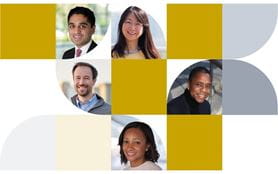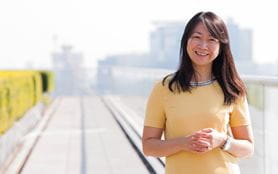An update on A&O’s charity partnership in a challenging year
Related people
Headlines in this article
Related news and insights
Publications: 11 December 2023
Publications: 11 December 2023
Publications: 11 December 2023
Publications: 11 December 2023
Responsible AI: navigating the risks and embracing the possibilities
Our global charity partnership with Hope and Homes for Children has been extended for one extra year, until July 2021, to provide extra support during the Covid-19 crisis.

Allen & Overy’s charity partner, Hope and Homes for Children, is working to end the institutional care of children around the world. Like many charities, its work has been affected by the Covid-19 pandemic which threatened to reverse much of the progress it had achieved for vulnerable families and children.
To support Hope and Homes for Children through this difficult period, we extended our charity partnership until July 2021, instead of concluding it in September 2020.
“The aim of our global charity partnerships is to make a sustainable impact on the charity and those it supports,” says Kate Cavelle, A&O’s Head of Pro Bono and Community Investment. “Extending the partnership also gives us the chance to complete some of the pro bono projects currently on hold – for instance those linked to postponed international events such as the Commonwealth Heads of Government Meeting in Rwanda.”
At the beginning of our partnership with Hope and Homes for Children, our target was to raise GBP1 million to tackle the root causes of orphanage confinement and family separation in India and Nepal – aiming to help 4,400 children either at risk of or already in confinement there – as well as to support the charity’s broader global campaign of transitioning children from institutions back into family-based care.
At the two-year mark, we had raised GBP1.2m and delivered pro bono and professional skills support worth more than GBP400,000.
It is welcome support for the charity’s frontline teams who “are working hard to maintain communication with families and orphanage staff to find solutions to their biggest needs,” says Kate Welsby from Hope and Homes for Children.
Covid-19 is much more than a health crisis for the vulnerable: the loss of livelihoods and homes is a catalyst for families to place children in institutions. For children already confined in orphanages, staff shortages increase the risk of harm and infection, especially for children living with disabilities and health conditions.
“We’ve been working around lockdown situations to provide food and healthcare supplies, as well as using mobile communications to offer vital counselling to children and parents,” says Kate. “We’re also responding to staff shortages in orphanages by developing training to reduce the risk of increased neglect and infection.”
In India and Nepal, where A&O is supporting a large programme of work, the pressure is on Hope and Homes for Children to ensure the progress being made there is not undone.
“Many children are already at high risk of separation because of poverty, child labour and trafficking,” says Kate, “and often end up in institutions because families believe they provide access to education and housing, without understanding their damaging effects.
“We’ve been working to reunite these children with their families or to find alternative care, as well as strengthening community services such as child protection committees and women’s groups to prevent separation in the first place,” she says. “But as the Covid-19 crisis escalated, we faced loss of safeguarding mechanisms and increased institutionalisation. Child protection became an even lower priority for the authorities.”

Progress towards broader global aims
Despite the Covid-19 pandemic, Hope and Homes for Children is still making progress with its wider programme of deinstitutionalisation. In 2019, it closed three orphanages in Bulgaria, Romania and Rwanda and is working to close 30 more institutions. Progress is being made across Bosnia and Herzegovina, Moldova, South Africa, Sudan and Ukraine.
Between January 2019 and June 2020, it also provided training for 7,688 child protection professionals, supported 948 children to leave orphanages for a new life in a family or community-based care, and worked with families to prevent 115,736 children from being confined within an institution.
One key pro bono project that has been completed is research into implementation of the Convention on the Rights of the Child across South Asia – led by an A&O team in Singapore – which highlights areas where action is needed to translate laws into visible outcomes for children. This was published in April 2020 and forms part of a broader project to contribute to a conference on child protection in Nepal (scheduled for 2020 but now postponed), which will bring together influential policy and decision-makers in Asia to learn about family strengthening and alternative care.
Combatting the long-term impact of Covid-19
Looking at the long term, Mark Waddington, CEO of Hope and Homes for Children, believes this is a humanitarian crisis like no other – and it is playing out in the homes of the most at-risk children.
“These are the families hit hardest by the lockdowns in their countries – prevented from working, with no money to buy food and medicine, pay rent or access online learning for their children,” Mark says. “We’re seeing too many cases of orphanage doors being locked and children incarcerated with no carers. Children are dying without support.
“But our connections to the most marginalised children means we are uniquely placed to tackle this, and by extending our charity partnership, A&O is enabling us to make a huge difference. By adapting our practices, we can support the wider humanitarian efforts that would otherwise fail to reach these families.”
Read more about A&O’s Pro Bono and Community Investment work in our bi-annual magazine, Increasing Access.
Frontline response in South Africa
Like many developing countries, South Africa has suffered under the impact of Covid-19. A failing health system, struggling economy, and shortages of food and clean water mean the most vulnerable communities are becoming increasingly marginalised.
A&O’s Johannesburg office responded by stepping up support for Hope and Homes for Children with extra funding from the local A&O Foundation combined with support to get food parcels and personal protective equipment (PPE) to at-risk individuals. We also linked Hope and Homes for Children with the Barjume Trust, another of our closest charity partners, which mobilised community organisations and local officials to enable and protect the operations of Hope and Homes for Children.
The two organisations have worked together to develop an approach that ensures charitable relief reaches the most vulnerable. They have built a Community Assist Network in Gauteng Province to help provide PPE for the children and workers in institutions there, as well as supporting hundreds of families with essentials, airtime and data vouchers.

Download the yearbook
Read our full Alumni Yearbook 2020
Download PDF



